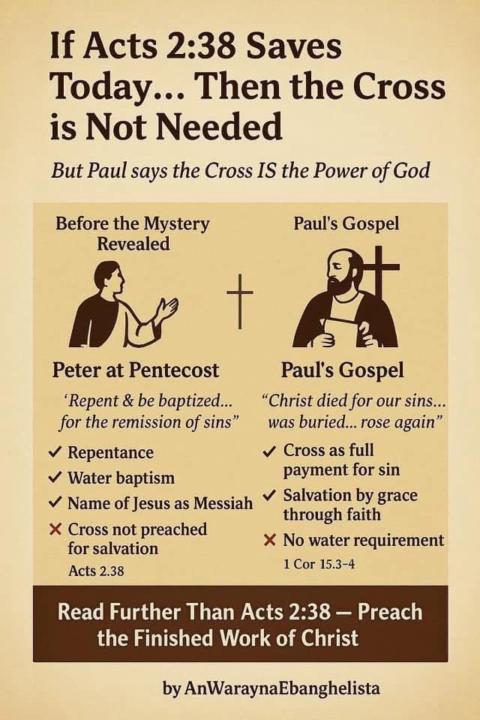Activity
Mon
Wed
Fri
Sun
Mar
Apr
May
Jun
Jul
Aug
Sep
Oct
Nov
Dec
Jan
Feb
What is this?
Less
More
Owned by Eric
At KSS, we aim to help believers dive deeper into God’s word, discovering their royal identity as kings and priests in His kingdom!
Memberships
9 contributions to Kingdom Studies on Skool
The Heart of the Matter: Why Baptism and Communion Are More Than Mere Symbols — Part 1
I want to speak plainly and lovingly about something that strikes at the very foundation of Christian life: the meaning and power of the two sacraments Jesus gave his Church — baptism and the Lord’s Supper. Too many Christians have been taught that these are nothing more than public ceremonies or reminders. That view treats them like museum pieces: beautiful to look at, but with no real power. I believe that is neither the teaching of Scripture nor the practice of the historic Church. Two short claims I will defend: 1. From the New Testament onward, baptism is presented as a means of regeneration — a real washing, burial with Christ, and rising to new life. It “does” something God promised to do. 2. From the earliest Christian writers, the bread and cup are spoken of as really participating in Christ’s body and blood — not merely as a symbol to stir memory. These realities are not “works‑righteousness.” They are promises from God, received by faith. The sacraments are God’s ordained means for conveying the blessings of Christ — applied to us by the Spirit as we trust God’s Word. Scripture foundations — baptism • “Unless one is born of water and the Spirit, he cannot enter the kingdom of God.” (John 3:5) — Jesus links water and Spirit with entrance into God’s kingdom. Many of the earliest Christians read this as baptismal language. • “Do you not know that all of us who have been baptized into Christ Jesus were baptized into his death? … we were buried therefore with him by baptism… that we might walk in newness of life.” (Romans 6:3–4) — Baptism = participation in Christ’s death and resurrection. That is not mere symbolism; it is union with Christ. • “Baptism… now saves you, not as a removal of dirt from the body but as an appeal to God for a good conscience, through the resurrection of Jesus Christ.” (1 Peter 3:21) — Peter plainly says baptism “saves,” though he clarifies it is connected to God’s action and our conscience/faith, not mere external washing.
1
0

The Baptizers Are Coming
The Baptizers Are Coming Hey — it’s okay to be different. John the Baptist didn’t fit the neat, groomed, Instagram-ready version of “church.” He was born into priestly lines (Luke 1:5), but God appointed him outside the temple — Spirit-marked from the womb and raised in the wild (Luke 1:15, 1:80). His sanctuary was the wilderness, his voice raw and relentless, and his job was simple but seismic: prepare the way and point people to the Lamb (Isaiah 40:3; John 1:29). Why this matters to your generation • Different isn’t a flaw — it’s a calling. If you don’t fit the tidy mold, you might be exactly who God needs to shake things up. • The church isn’t limited to polished buildings or curated programs. It can be a movement that meets people where they actually live — the margins, the late-night chats, the streets, the campus, the DMs. • Being a “baptizer” is both prophetic and practical: call people to repentance, baptize into new life, and prepare hearts for Jesus (Matthew 3:5–6; Matthew 3:13–17). What a wilderness church looks like • No walls: community that crosses race, class, and ideology. • No filters: honest conversations, messy faith, real worship. • Big risks: serving in places others avoid, loving people who’ve been ignored. • Bold sacrament: baptism as a public, ordinary act of new life. You don’t need temple credentials John never went to seminary for this role. He didn’t seek approval from religious elites. His authority came from being filled with the Spirit and from living out his calling (Luke 1:15, John 1:33–34). Likewise, your worth to God isn’t measured by how “churchy” you look — it’s measured by how faithfully you follow the call. Practical first steps • Go where people are. Listen before you lead. • Form small crews for prayer, service, and honest talks. • Make baptism and invitation ordinary. • Break down walls and build bridges. This is a radical, generational call The Baptizers are coming — a movement of prophet-priests in the wilderness. They’ll be rough around the edges, fearless in the face of opposition, and on fire with a purpose that won’t be quenched (John 1:29; Matthew 3). If you feel out of place in tidy religion, don’t shrink. Step into the wild. Prepare the way. Point people to the Lamb. Build a church that has no walls, only witnesses. Will your generation answer?
1
0

🌟 Breaking Free from Church Hurting Systems: Rediscovering Our True Identity as Kings and Priests 🌟
This is a conversation that many in the body of Christ find difficult, yet it’s one that desperately needs to be had. Too often, the church—a place meant for healing and restoration—becomes a source of pain and neglect. While it’s essential to acknowledge that not all ministries are flawed and not all churches are harmful, we must confront some troubling realities. Over the years, I’ve observed common threads that contribute to what can only be described as witchcraft in the pulpit and sorcery in the pews. Let’s be honest: much of what we label as “church hurt” stems from feelings of being overlooked or unrecognized for our gifts and abilities. When our contributions go unacknowledged, we may be unfairly labeled as rebellious or divisive. On the flip side, many pastors find themselves restricted in their vision—not because they lack the desire to fulfill their calling, but because they are bound by outdated doctrines and previous moves of God. Some are stuck in a mindset that hinders their ability to move forward, failing to stay yoked with Christ. It’s only when we are truly connected to Him that we break free from the chains of man’s religion and the doctrines of men. One of the pivotal issues we face is the reliance on a Levitical model of ministry when we are called to operate under the order of Melchizedek. The Levitical system represents what man builds, focused on human purposes and plans, while the Melchizedek order is entirely led by the Spirit of God. In a Levitical framework, churches are often governed by a singular authority, where one high priest oversees subordinates. In contrast, the Melchizedek order recognizes that we are all called to be both kings and priests, each commissioned to our unique regions and communities. Looking back at the early church in the book of Acts, we see a community where no single individual lorded over the people. They shared everything in common, and while elders were present, they were not distanced from the lives of their community. Until we restore the ecclesia to its original intent—producing and preserving the king-priest order—we will continue to experience church hurt. Why? Because each of us is hungry to manifest the fullness of Christ in our lives.
Baptism By Faith hits differently…
I saw this picture post and feel compelled to correct the thought. It is wrong and demonic. Here is my response: We access His death, burial, and resurrection by faith—through faith in His baptism (Romans 6:3–4; Colossians 2:12).It is not by the works of the law but by faith (Romans 3:28; Galatians 2:16; Ephesians 2:8–9).Baptism by faith grants us entry into His baptism, which is connected to His death, burial, and resurrection; when we are baptized we are united with Him in His death, and when we are raised out of the water we participate in His resurrection (Romans 6:3–4; Colossians 2:12).At His baptism the Father said, “This is my beloved Son, in whom I am well pleased,” and in Christ we are accepted (Matthew 3:16–17; Luke 3:21–22; Ephesians 1:6).Some have been taught that baptism is a work of the flesh; it would be if done apart from faith, but Scripture speaks of baptism “through faith in the working of God” and teaches that without faith it is impossible to please God (Colossians 2:12; Hebrews 11:6).Likewise, praying words without faith does not save—mere words apart from faith carry no promised saving power (Matthew 7:21; James 2:14–17; Ephesians 2:8–9).The so‑called “sinner’s prayer,” apart from true faith and repentance of heart, has no explicit saving promise in Scripture; salvation is tied to heartfelt belief and confession (Romans 10:9–10; James 2:26).Talking is no different than water immersion apart from faith: both are empty actions without faith (James 2:17, 26; Colossians 2:12; Hebrews 11:6).Some reject baptism as optional, but Scripture presents it as the first public act of obedience and an expression of faith (Matthew 28:19–20; Mark 16:16; Acts 2:38; Galatians 3:27; Romans 6:3–4), James 2: 26 For as the body without the spirit is dead, so faith without works is dead also.
0
0

🔥Last Night I had a dream of one sound. I awoke with this prophetic message in my heart:
📣 I hear a new rising—apostolic teams are arising now. These will not be loose organizations or celebrity platforms, but pairs and bands aligned in the Father’s purpose and the counsel of heaven. They will carry a unified perception of God and steward great power. Their faith will kindle nations. They will be radically faithful rather than glamorous. Like Peter and James, like Paul and Silas, they will move in partnership—two by two, carrying the authority of Christ. Their oneness with the Spirit will open doors in the heavenly places and dismantle strongholds; the entrance of their unity will dethrone spiritual principalities. Signs and wonders will attend their steps, and from their presence rivers of great faith will flow. I also see the 144,000—Jewish, anointed witnesses—partnering as two, forming 72,000 teams. From them the gospel of the kingdom will flow unstoppable. They will not chase titles or personal fame. Their hunger is singular: to exalt the Father and His Christ, to see the King enthroned in people and nations. They will go house to house, region to region, nation to nation, bringing liberating truth and empowerment. They are true servants—on fire for God’s purposes—joint flames burning with truth and power. Humility will mark them; they seek not their own, but the glory of the Father. They do not come to be served but to serve, to lift up the name of the Lord until it is great in all the earth. Because of their entrance, nations will be shaken. Many church doors will close—not from scandal or failure, but because leaders hear the call of oneness and release congregations into kingdom assignments. These closures will not be endings but transitions into a new deployment of the Ekklesia. These are not merely revivalists. They are king-reconcilers and kingdom ambassadors—unified in voice, mind, and heart. Prepare for partnerships that refuse division, that will contend for the unity of the Spirit, and that will press the kingdom forward with humble authority.
2
0
1-9 of 9
Active 75d ago
Joined Aug 12, 2025
ENFP

